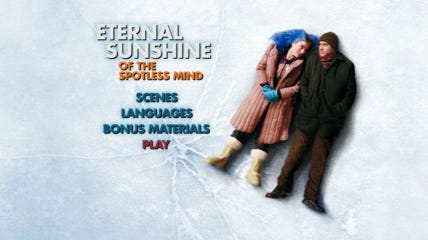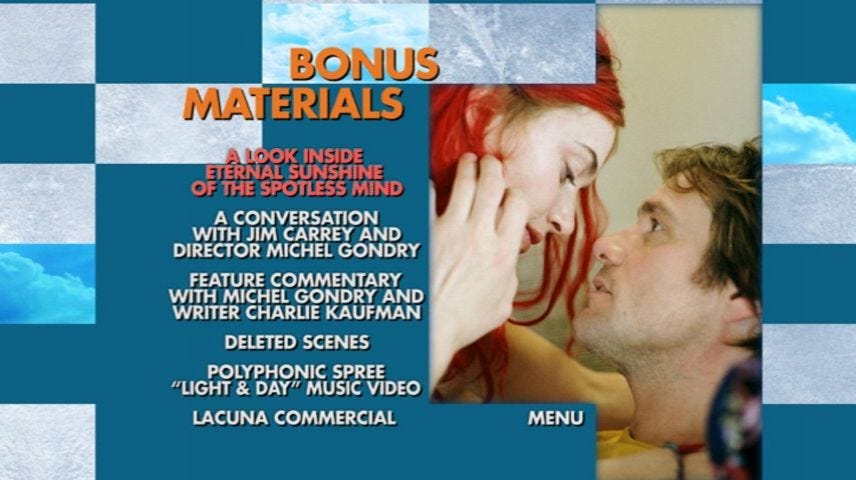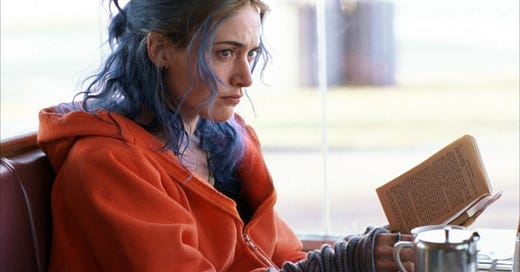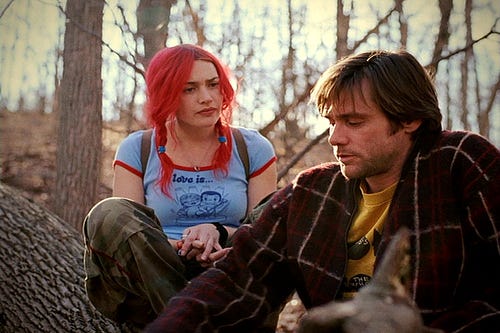Poets Watching Movies: An Annotated Eternal Sunshine of the Spotless Mind (Elder Millennial Edition)
…from a source that may not exist.
You’re reading a PopPoetry guest post by Laura Eppinger. Check out Laura’s previous post here.
Want to write about poetry and pop culture? Pitch a guest post!
Eternal Sunshine of the Spotless Mind (2004) is many things: a thought experiment about what would happen if one eccentric Long Island doctor invented a procedure to physically remove memories from the human brain at any patient’s discretion, a horror story about the loss of bodily autonomy, or perhaps a meditation on dementia. A movie that illustrates one point made by poet Alexander Pope that it is impossible to truly remove a past love from one’s mind. An experimental and highly stylized sci-fi experience curated by scriptwriter Charlie Kaufman and director Michel Gondry. A companion to a truly wonderful soundtrack. And so much more.
The film stars Kate Winslet as Clementine and Jim Carrey as Joel, two star-crossed lovers recently broken up and paying for the surreal procedure to erase the other from their minds. The movie asks: If we lose our memories, do we lose parts of our identities? Is it possible two people who are drawn to each other will continue to wind up together, no matter how painful their past may be?
Perhaps the film takes place in an alternate dimension that is just slightly different from our own. And now, looking back, we can see that so much about American life in the early aughts is captured here. No one scrolls on a cell phone, no one appears to use social media. (This premise is impossible in 2022 due to social media alone. It’s hard to image a four-person medical office able to delete every trace of a relationship due to screenshots and the Internet Archive.) Characters call one another on landline phones, and so on.
Eternal Sunshine is now another timeline in the multiverse, a time capsule from our own reality, and reminds me of my own personal lacunae when it comes to memory and writing.
Elder Millennial Annotation
Much in this film feels timeless and true, but I cannot forget that this film is also a relic from the age of “Special Features” on DVD menus. Deleted scenes, original theatrical trailers, cast interviews, tie-in music videos, and other promotional materials were usually available on film DVDs. Before I had a smartphone or social media profiles, this was the content I consumed endlessly, at any time of the day, as constantly as I could.

Once my friends and I could drive, we drove to Blockbuster. We had to fork over at least $5 for a single DVD loan, so we were determined to get our money’s worth. The first viewing was done with purpose and reverence; we paid deep attention. (Eternal Sunshine famously required a few close viewings to “get” what was happening.) After that, a borrowed DVD was to be played at low volume in the background for the rest of the rental period—three days perhaps, maybe five. Whenever I was alone in the basement of my parents’ house, crashing in the guest room during my first winter break from college, I watched the director’s commentary. This was a convention where the entire movie played but its soundtrack was lowered while the director, screenwriter, and occasionally actors rotated in and out to share perspective on the film. Insights into script changes and deleted scenes, fun facts, and behind-the-scenes insights were shared, and I collected these to wow my friends later with all that insider knowledge. Memories of this director’s commentary seeped into my future viewings of this film, imbuing additional meaning.
Director’s Commentary
I offered to write this post before I’d actually hunted down a way to re-watch the director’s commentary I screened at home several times for myself in 2005. What follows is my attempt to reconstruct from memory what Charlie Kaufman and Michel Gondry discussed over the film as it played. Much of this is likely inaccurate due to the passage of time (more than 15 years) as well as where I was at when I watched: 18 years old, newly enamored with the freedom of attending college 800 miles away from home in the downtown of a city. And crucially, enamored with getting back together with my high school ex, though many miles separated us now.
I’ll cut to the chase: I cannot find this “director’s commentary,” and was unable to watch this again for the purposes of this writing. My personal DVD copy has been lost for a decade, since someone loaned it to their crush; the crush didn’t reciprocate and also kept my DVD. I can’t pay to stream the director’s commentary on Prime; though I could pay to stream the theatrical cut. (If I “own” this stream for $14.99 do I get those old Special Features, or are they gone forever, with DVD title menus? No one has been able to tell me.) I can’t find the director’s commentary as clips cut up across YouTube videos. Not even my university library credentials can get me there.

However, I can prove that this director’s commentary does exist: it is cited in a footnote on the movie’s Wikipedia page, though the link has gone dead. Also the very niche website RateThatCommentary.com rates it (rather poorly) so it must be real. That’s the only evidence I can find that this video feature I once watched and tried to memorize even existed at all.
Below is my attempt to reconstruct the fun facts and deeper significance of certain elements of this film, from memory. Eternal Sunshine is a film in part about the limits of technology and science because of human nature, in all its illogical and inconsistent glory. This post is, in part, about the limits of our current content streaming/consuming abilities, and the way content can still slip through the cracks and become lost, even in our era of Big Data, cloud storage, and constant surveillance. Even in the year 2022, there are some things I can only access from my own memory.
Faulty Memory Annotation
Because this film can only grow older (as I can only grow older), here is an annotated guide to the film to highlight its nuanced script and deeper meanings, as well as translation ofcultural artifacts from 2004:
Blue Ruin: Clementine always has brightly dyed hair in unnatural colors like orange or green. During their first (re-)meeting, Joel comments that he likes Clem’s hair, and she tells him the name of the color is “Blue Ruin.” I have a fuzzy memory of Kaufman saying in the lost director’s commentary that this came from a song lyric. I remember thinking at the time that the band was probably too hip or underground for my taste. At 18 years old I felt like a whipper-snapper, and an imposter, at all times.
Today I cannot find “blue ruin” as a song lyric of any genre; or at least not one that could have made it into a script from 2004. When I Google “blue ruin,” the top search result is a 2013 movieby that name, followed by a song by a band (?) called “Mandolin Orange.” That could make sense! Clem’s hair is orange at one point! But the song is from 2009, too late to have been referenced in Eternal Sunshine. [Editor’s note: the name is actually from a Tom Waits song, but I don’t know how I know that. Another lacuna.]
Bartlett’s Book of Quotations: The cast of Eternal Sunshine includes the scrappy young technician team that does the dirty work of erasing a person’s memories while they sleep. Kirsten Dunst plays Mary, a receptionist at the doctor’s office who is dating Stan, a memory technician (hello, Mark Ruffalo!). Mary travels with a Bartlett’s Book of Quotations, a collection of snappy phrases from noteworthy figures, and tries to memorize quotations related to memory.
Mary memorizes quotations to impress the boss she’s crushing on, but even the most enthusiastic teacher’s pet today may not be familiar with Bartlett’s. The last printed edition came out in 2012; it can be downloaded today in app format. Ironically, contemporary research suggests that humans comprehend and retain less when they read on a phone or device. A 2022 Mary might receive daily quotations from the Bartlett’s app, butstruggle twice as hard to memorize them.
Lacuna: The name of the company that provides the memory-erasure procedure is Lacuna, another word for a gap or missing portion from a manuscript. In the world of Biology, this is a word for a depression or removed bit of bone. The film Eternal Sunshine itself preserves the deleted memories for Joel, filling its own lacuna.
In the previous semester before I watched this film, I reviewed a new album by Italian metal band Lacuna Coil for my college newspaper. Those two instances of the word are tied together forever to me.
Memory Motel: What is it about Montauk? It is the easternmost tip of Long Island: a vibrant beach destination every summer, hauntingly abandoned during each winter. When a rebellious memory of Clementine schemes to stay alive in Joel’s memory after the procedure, she calls to him, “Meet me in Montauk.”
Montauk is tied to memory and heartbreak in rock’n’roll legend: The Rolling Stones song “Memory Motel” was inspired by the actual hotel by that name in Montauk.
See also: Elder Millennials who were inspired by the odd beauty of snowy beach scenes in this film, then spent inordinate amounts of time taking snowy beach selfies for their MySpace profiles. (They’re the same people who referred to their college sophomore one night stands as “It’s just like Garden State!”)
Mierzwiak: The name of the fictional doctor who invented the lacuna procedure was significant but I can’t recall why. I believe Gondry said in the director’s commentary that this name came from a philosopher of memory or consciousness, or a famous neurosurgeon or medical researcher.
When I search the name Mierzwiak on both Google and my university library system, I only get returns that are about the movie Eternal Sunshine. This name is a keyword in papers on medical ethics and philosophy of the mind. I cannot locate a real-life namesake though I am still certain one exists.
The only conclusion I can draw here is that it’s fitting that my own memories around this film are riddled with lacunae, and that the fickle memory of the Internet has not preserved enough of the world of 2004 for me to refer back to less than two decades later. Eternal Sunshine has been in the world long enough to have a longer “paper trail” than the cultural artifacts that informed it. If there is any movie that deserves to be self-referential, referring back only to itself for infinity, it is Eternal Sunshine of the Spotless Mind.
Memory, Writing, and the Internet
When I was 18 years old and first watched Eternal Sunshine, I was personally on a mission to write down everything that happened to me every day in an online blog via LiveJournal.com. I was determined to record every part of every day, keep inga record of evidence. Every night I diligently posted about the college classes and on-campus jobs I attended, little snippets of things I was learning, inside jokes with friends and roommates, and headlines from the day’s news.
But after rereading posts even a few years later, I found I’d forgotten what those inside jokes were referring to. Or perhaps, my friends remembered the source of a shared joke differently than I did. (But I had evidence, I once insisted.) Even more traumatic, before I made it out college, LiveJournal lost its credibility with English-speaking users. At its peak in 2005, more than 2.5 million accounts were active on the site. But only two years later in 2007, Russian blogger Roman Liebov purchased the company and shifted its focus to help Russian-language users claim Livejournal as a renegade news platform, free from the meddling of the Kremlin. The site hemorrhaged English-language users, like my friends and I, who were daily posters for years. We backed up our posts as PDFs to live in the bowels of inboxes, then deleted our accounts. My personal, shared archive was wiped off the Internet, and it wouldn’t be the last. MySpace, the social networking of my undergrad years, would fall from social media dominance and suffer major data loss, another tribute to impermanence.
It was a hard lesson for me to learn, that trying to use social media websites as the ultimate archive of my life was as futile as building a sandcastle and expecting it to stand up against the waves. My expectation that I could hold on to so many quotidian memories, even with the aid of LiveJournal posts, is counter to my own human nature (or brain function). Plus, current research shows that even our memories of those big, collective tragedies (like where we were on 9/11), also called “flashbulb memories,” are less accurate than we believe. In fact, after only one year, these memories start to fade or blend with other memories, or the stories others have shared about the event in question.
Now that my first year of undergrad was half my lifetime ago, I have accepted that the human brain is so complex I may never fully understand mine, and that no matter how faithful I am to a daily journal practice, there are bits of my own life I will forget forever. Things get lost inside my head, and the Internet is not the eternal archive, either.
Humans made the Internet, and it turns out we made it in our own image: fickle, with limited memory space.
We are born. We live. We forget.
That’s all for this month, folks! See you December 7th for a deep dive into Andrew Bird’s Dickinson-inspired collaboration with Phoebe Bridgers!









Thanks for this post. I loved this movie when it came out and instantly bought the DVD when it was released. After reading this, I went to look for it and found it: both discs still there! Wish I could share it somehow.
Interesting detective work on a film I’ll admit to almost no recollection of anymore.
An older friend swore she would never get “hooked up” to streaming because she didn’t believe it would match the experience possible with an annotated DVD. She might have been right, although I generally found that watching the extras on DVDs immediately after the movie tended to deflate my experience of the movie.
Montauk? I always think Whitman when I hear that name and his late poem “From Montauk Point.”
https://www.amazon.com/Walt-Whitmans-New-York-Manhattan/dp/0941533778
Mierzwiak? For some reason that brings to mind the trickster character in Superman comics, Mr. Mxyzptlk. Probably has nothing to do with the movie, but does have most of the letters for a kind of ersatz anagram. Screenwriters have been known to do worse.
https://en.wikipedia.org/wiki/Mister_Mxyzptlk